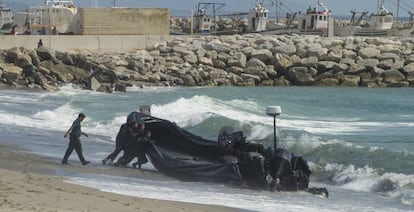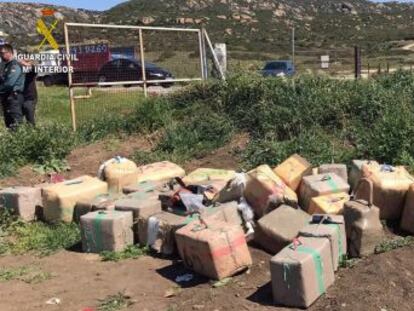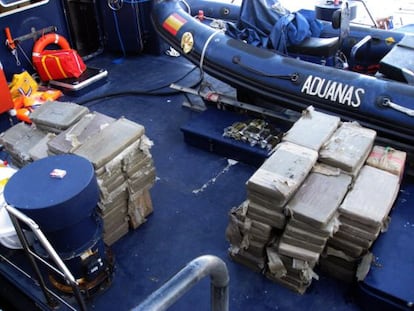The fight against Spain¡¯s increasingly brazen drug traffickers
Gangs are unafraid of law enforcement as they ship hashish into Europe near Gibraltar

As wars drag on, things get worse. At noon on Sunday, April 16, just as participants at the last Easter procession in La L¨ªnea de la Concepci¨®n (Cadiz) were calling it a day, a speedboat filled with hashish was pulling into the fishing port. The plan was to unload the goods and speed away in 90 seconds, but three Civil Guard officers were waiting on land.

Until now, the mere presence of the officers would have been enough to make the criminals turn around. But not this time. Suddenly, more than 100 people emerged from the nearby neighborhood of La Atunara, ready to defend the traffickers and their goods. Four more law enforcement officers answered the call for reinforcements, but all seven were held back under a volley of stones.
The incident is alarming, but it did not come as a surprise to the officers fighting drug trafficking in Campo de Gibraltar, the area around the British overseas territory of Gibraltar and one of the biggest hashish entry points into Europe.
We have extremely high unemployment. Around 45% of people do not finish elementary school Juan Franco, mayor of La L¨ªnea
This is the way in which drug smugglers respond these days to barriers set up at the mouth of the Guadarranque, known popularly as the ¡°river of drugs.¡±
¡°What used to be witnessed only by residents of San Roque, who have views onto the river, is now in plain view for everyone, and logically it creates alarm,¡± says Francisco Mena, who coordinates Nexos, a federation of anti-drug associations. He is talking about drug shipments delivered in broad daylight on beaches and crews using increasingly violent means to avoid capture.
The new ¡°anti-narc barrier¡± on the Guadarranque has forced drug smugglers to find other ways into Spain via different parts of Cadiz province: La L¨ªnea, Algeciras, Barbate, Chiclana, Conil or Sanl¨²car. But there is one spot that stands out above the rest: El Tonelero beach in La L¨ªnea. This is a perfect landing site because streets and homes are just 200 meters from the beach.
¡°This makes it easy to drive onto the beach using all-terrain vehicles. We put up blocks and a wall, but they moved the blocks and tore down the wall. Their infrastructure is almost better than the state¡¯s,¡± explains Juan Franco, mayor of La L¨ªnea, with desperation.
Police unions highlight the need to beef up their numbers and resources
¡°This is a game of cat and mouse,¡± says Jorge Ram¨ªrez, the Tax Agency¡¯s special delegate to Andalusia. ¡°The port of El Tonelero is a regular stop for them, but once it gets more well known, they will seek out another place.¡±
¡°They are like an incorporated company that generates a narco-economy, subject to the laws of supply and demand. The increased availability of unemployed manpower in the area means that narcos are only willing to pay half of what they used to,¡± says Mena.
The police unions have been complaining for a long time about the need to beef up their numbers and resources. ¡°The government subdelegation usually says that the personnel quotas have been filled, but these have not been updated for the last 15 years, and they were created for a very different reality from today¡¯s,¡± says Jos¨¦ Encinas, the provincial secretary for the Civil Guard¡¯s Unified Association. There are 1,100 officers stationed at the southern center of Algeciras, but Encinas figures that ¡°between 30% and 40% more are required.¡±
¡°If the state does not provide an immediate response, these mobsters act with a sense of impunity,¡± adds Franco, the mayor of La L¨ªnea.
¡°There used to be an unwritten rule by which if officers caught them, criminals dropped their cargo and fled. Not now; now they are swaggering all over the place,¡± adds Mena. He describes incidents in which traffickers used three high-speed vehicles, one of which was used to smash into police patrol cars. Or the recent case that saw scores of people coming out of their homes to protect traffickers against law enforcement officers.
¡°We are reaching a threshold of violence which, once crossed, there is no going back on.¡±
Neighborly help
Much of the violence is made possible through the connivance of the network of people who feed off the drug trade. They are ¡°employees,¡± but also friends and relatives who do not hesitate to defend the traffickers using stones or whatever else is handy.
¡°It is a sociological problem. We have extremely high joblessness rates of 35%. Of those people, around 45% did not complete their elementary school studies,¡± says the mayor of La L¨ªnea. Drug traffickers offer them up to €1,000 a day just to inform them of the police¡¯s whereabouts.
¡°Collaborating with the mafias becomes justified, and eradicating that environment is very difficult when you have no alternative to offer,¡± Franco points out.
Although the people helping the traffickers are a minority, they have more impact than the ¡°silent majority,¡± as Mena points out.
¡°In the 1980s, the heroin smuggled in would remain in the area. That caused suffering, and the mothers of drug addicts went as far as to stage protests on the doorsteps of dealers¡¯ homes. But these days the hashish does not stay here, it is moved on into Europe, and it is harder to confront your neighbor if the problem is not affecting you directly.¡±
In its latest annual report, dated 2015 (a year that saw 202,696 kilograms of hashish seized, 37,901 kilograms more than in 2014), the Cadiz Anti-Drug Attorney¡¯s Office warned about ¡°the defiant attitude¡± displayed by the traffickers. Ram¨ªrez asserts that both the amount of drugs and the level of violence are on the rise, although he does not believe that impunity reigns.
¡°The proof lies in the Guadarranque barrier (which has already been sabotaged twice). On the coast, surveillance in the area is five times what it is in other parts of Spain. But even if we formed a human chain with guards holding hands, they would still find a gap to slip through.¡±
English version by Heather Galloway.
Tu suscripci¨®n se est¨¢ usando en otro dispositivo
?Quieres a?adir otro usuario a tu suscripci¨®n?
Si contin¨²as leyendo en este dispositivo, no se podr¨¢ leer en el otro.
FlechaTu suscripci¨®n se est¨¢ usando en otro dispositivo y solo puedes acceder a EL PA?S desde un dispositivo a la vez.
Si quieres compartir tu cuenta, cambia tu suscripci¨®n a la modalidad Premium, as¨ª podr¨¢s a?adir otro usuario. Cada uno acceder¨¢ con su propia cuenta de email, lo que os permitir¨¢ personalizar vuestra experiencia en EL PA?S.
?Tienes una suscripci¨®n de empresa? Accede aqu¨ª para contratar m¨¢s cuentas.
En el caso de no saber qui¨¦n est¨¢ usando tu cuenta, te recomendamos cambiar tu contrase?a aqu¨ª.
Si decides continuar compartiendo tu cuenta, este mensaje se mostrar¨¢ en tu dispositivo y en el de la otra persona que est¨¢ usando tu cuenta de forma indefinida, afectando a tu experiencia de lectura. Puedes consultar aqu¨ª los t¨¦rminos y condiciones de la suscripci¨®n digital.










































